
SWT/KWS MARA MOBILE VETERINARY UNIT
FEBRUARY 2024
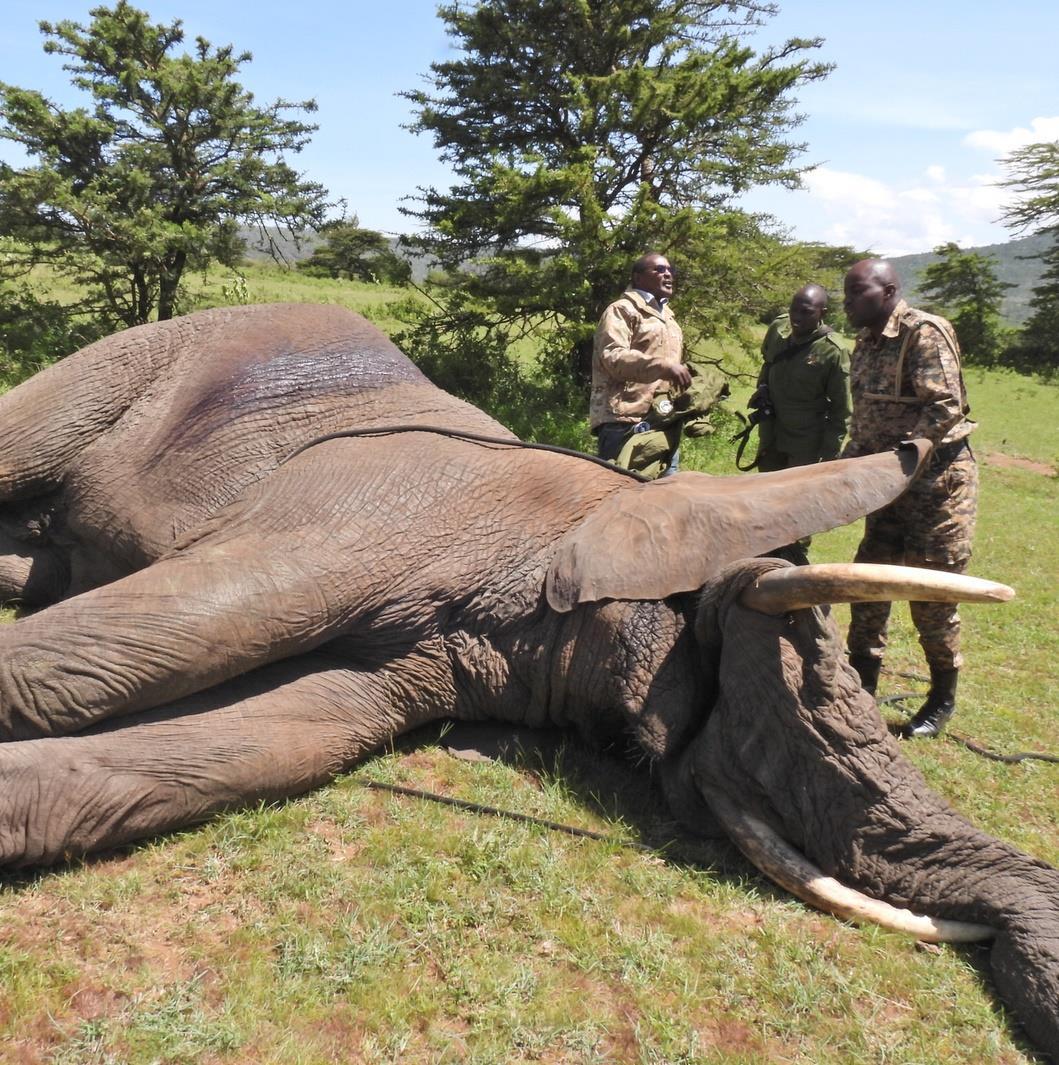

Introduction

8 Cases in February 2024
February 2024

6 Poaching Cases
Report by Dr. Dr. Michael Njoroge

4 Elephant Cases
The Mara Vet Team resumed duty with the intention of fostering health and welfare to the animals in this new and promising year.
During the month, the unit attended to six poaching cases including a snared elephant, a snared zebra, 3 speared elephants and one arrowed giraffe. A cheetah and an eland were also attended to for injuries due to natural causes. Thankfully all the cases were given a good prognosis.
Acknowledgement
The Mara Mobile Veterinary team greatly appreciates Elizabeth Scarlett for funding the Unit through the Sheldrick Wildlife Trust. The team also thanks Kenya Wildlife Service for providing technical support and all the conservation partners who contributed to the success of veterinary interventions through timely reporting of veterinary cases and monitoring of treated animals.
Case Details
Date Species Area Found Reason for Intervention Outcome 5-Feb-24 Elephant Olkinyei Conservancy Snared 45-year-old elephant bull with a wire snare around the right hindlimb Successfully Treated 10-Feb-24 Cheetah Maasai Mara NR Natural Causes Adult male cheetah with Otitis media (infection of the middle ear) Successfully Treated 13-Feb-24 Giraffe Maasai Mara NR Arrow Adult female Masai giraffe with an arrow wound on the left thigh Successfully Treated 13-Feb-24 Elephant Siana Conservancy Spear Adult male elephant bull with a spear wound on the medial aspect the left forelimb Successfully Treated 13-Feb-24 Elephant Maasai Mara NR Spear
elephant bull with an infected spear wound on the right flank. The elephant's inguinal glands were massively swollen Successfully Treated 17-Feb-24 Zebra Aitong Snared
male common zebra with a snare around the distal phalanx of the right hindlimb. The tight snare had cut through the soft tissues and had reached the bone Successfully Treated 23-Feb-24 Elephant Siana Conservancy Spear An adult elephant bull with a spear wound on the right flank and tail Successfully Treated 23-Feb-24 Eland Sekenani Natural Causes The elend calf was in very poor condition, dull and with a scanty hair coat Successfully Treated
Adult
Adult
SWT/KWS
February 2024
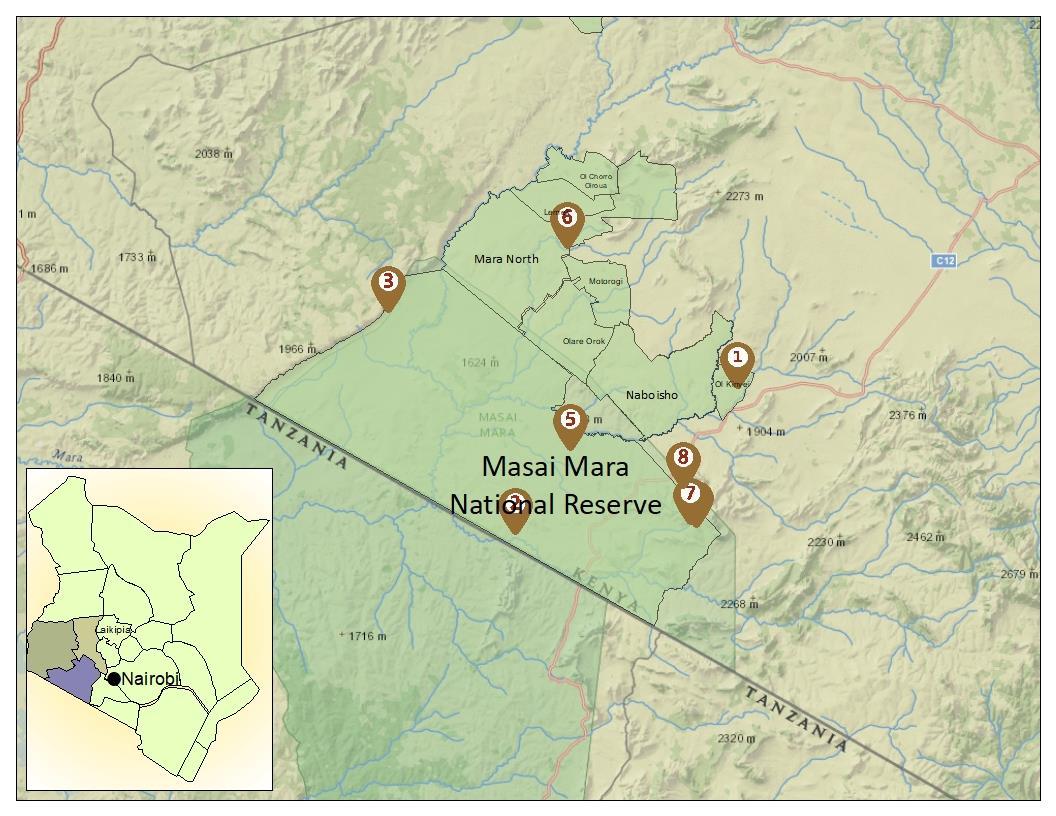
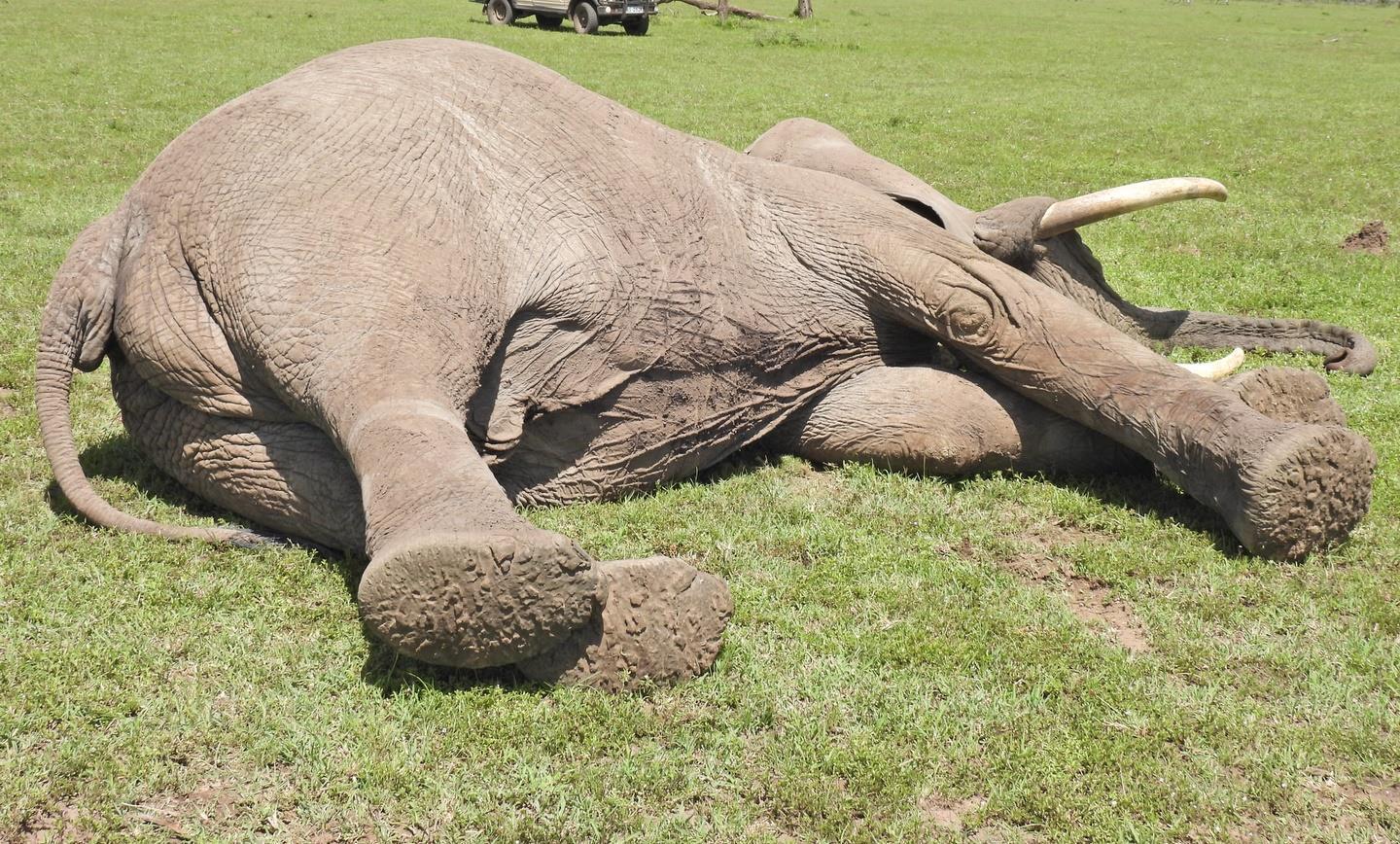
Mara Mobile Vet Unit Treatment Locations
Case 1 – 5th February 2024
Elephant Snared
Olkinyei Conservancy
The rangers from the Olkinyei Conservancy had spotted an adult male elephant that had a snare around the right hind limb. The Mara Vet team were informed and in due time arrived for a prompt intervention.
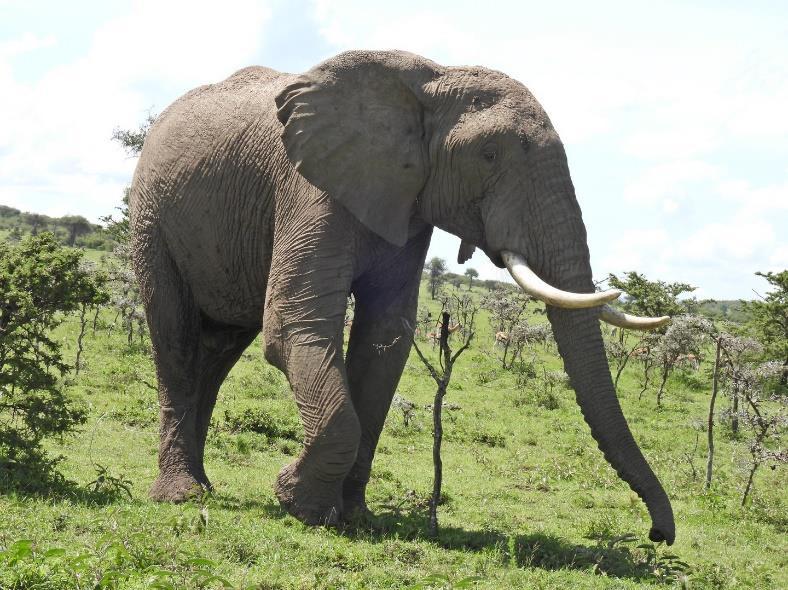
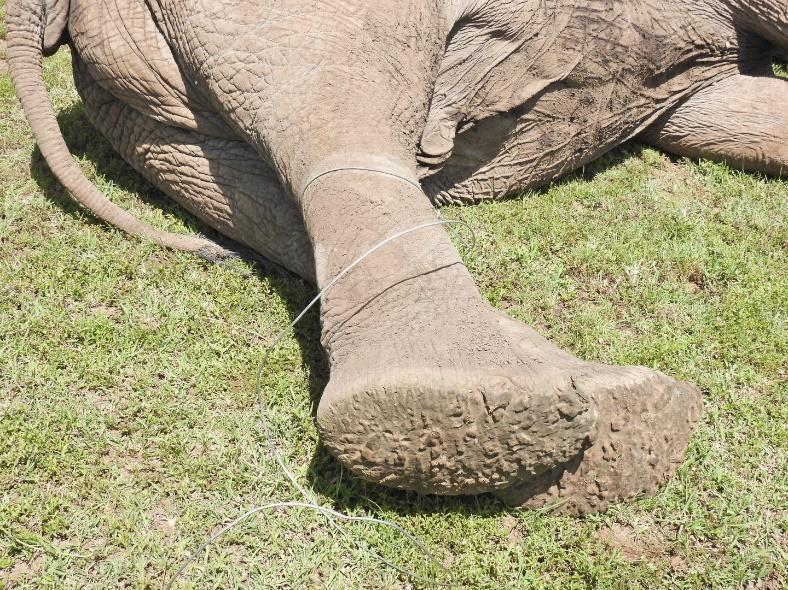
Immobilisation, examination and treatment
The animal was darted successfully with 16 mgs of Etorphine, it made some efforts to run away. It was immobilized in seven minutes and then fell to the ground with a slight push using a rope so as to fall in the right direction.
Once the animal was down, an assessment was done and it was found that the snare hadn’t affected the soft tissues hence the snare was removed and the elephant left to go free.
Revival and prognosis
It was revived using 170mgs Naltrexone into the ear vein and third of the drug intramuscularly. It was given a good prognosis.
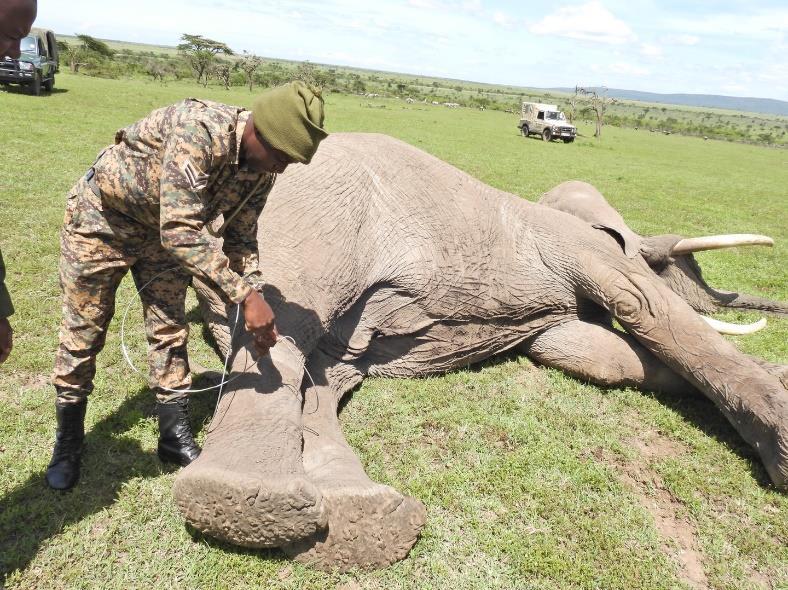

Case 2 – 10th February 2024
Cheetah Natural Causes
Maasai Mara National Reserve
A territorial fight was reported to have occurred in the early morning of by the Masai Mara Security Rangers. The fight was between two cheetah brothers and a lion. One brother was injuried but the other had no injuries Immobilisation, examination and treatment
The cheetah was darted from the vehicle using 300mgs Ketamine and 4mgs Medetomidine. He assumed sternal recumbency in five minutes and was left for another fifteen minutes to be completely sedated. The brother was driven about fifty meters away into a small thicket where it rested until we finished treatment.
The ear was flushed with Iodine, water and antibiotics. Both ears were administered with systemic 30mgs Dexamethasone and 30000mgs Amoxicillin into different muscle sites. 50mgs Ivermectin was injected under the skin to act as broad-spectrum anthelmintic.
Prognosis
This was done one hour post immobilization by injecting 15mgs Atipamezole deep into the muscle. Ear shaking and palpebral reflexes started after fifteen minutes post reversal and in fifteen minutes later he assumed dog sitting posture. It was left under the keen watch of his brother who had was driven after treatment to join him.
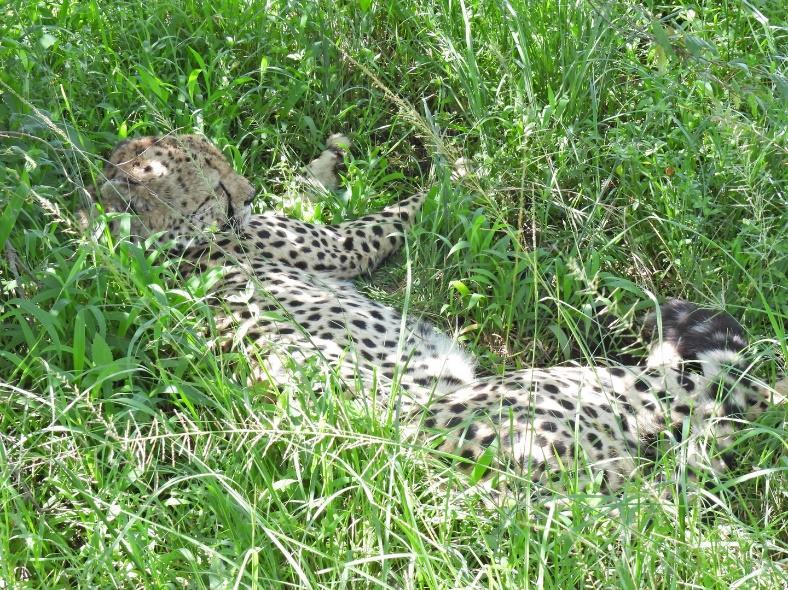
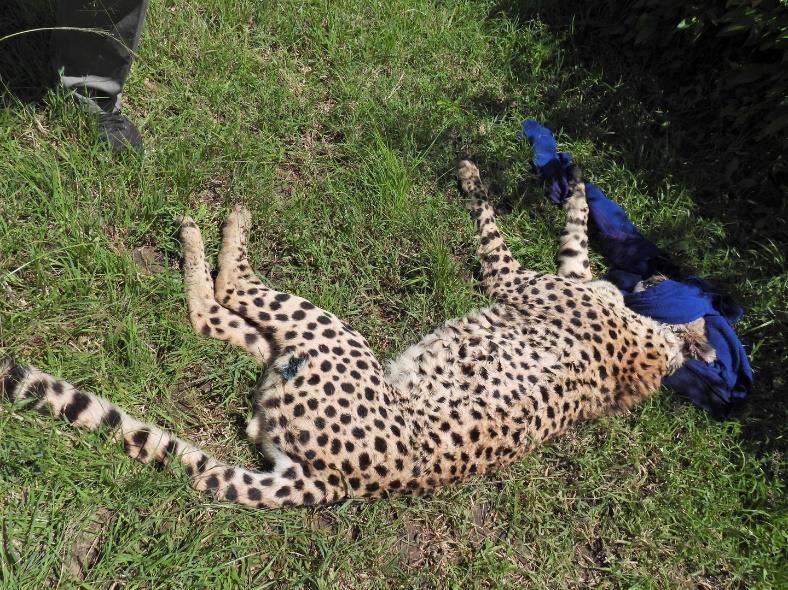
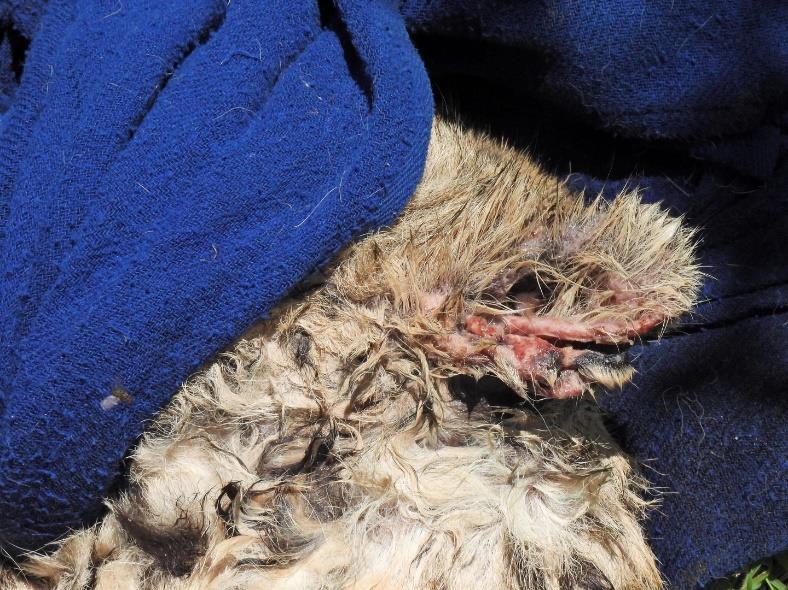
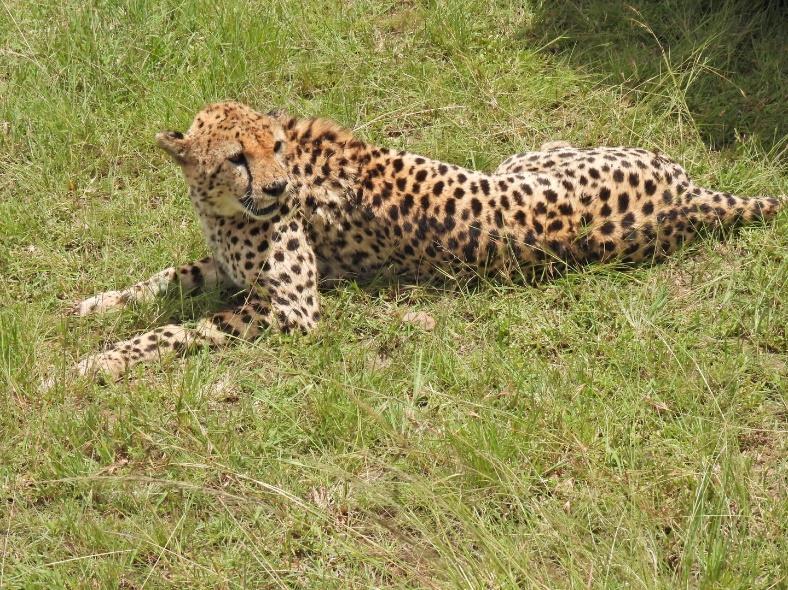
.
Giraffe Arrow
Maasai Mara National Reserve
The arrowed giraffe was sighted and reported by the County Ranger. The response was launched immediately, we arrived and assessment of the terrain was done in order to prevent the animal from falling over the escarpment before darting.
Immobilisation, examination and treatment
The giraffe was found facing the wrong direction hence with the aid of the rangers, we changed the course of movement together with the herd. After 10-15 minutes of pushing to a better site the animal was in a good position and darted successfully with 15mgs of Etorphine and 25mgs Azaperone , it made some efforts to run away . It was immobilized in seven minutes but remained standing and a long rope were used to bring it down. The animal went down smoothly and was maintained by pinning the head and neck on the ground.
The arrow was absent, but infection had set in. The wound was first thoroughly cleaned with Hydrogen peroxide, water and iodine. It was finally sprayed with Tetracycline. Systemically it was injected with 3000mgs of Amoxicillin into two muscle sites and 40mgs Dexamethasone into the muscle.
Prognosis
Good- she is expected to recover fully with a very short time.
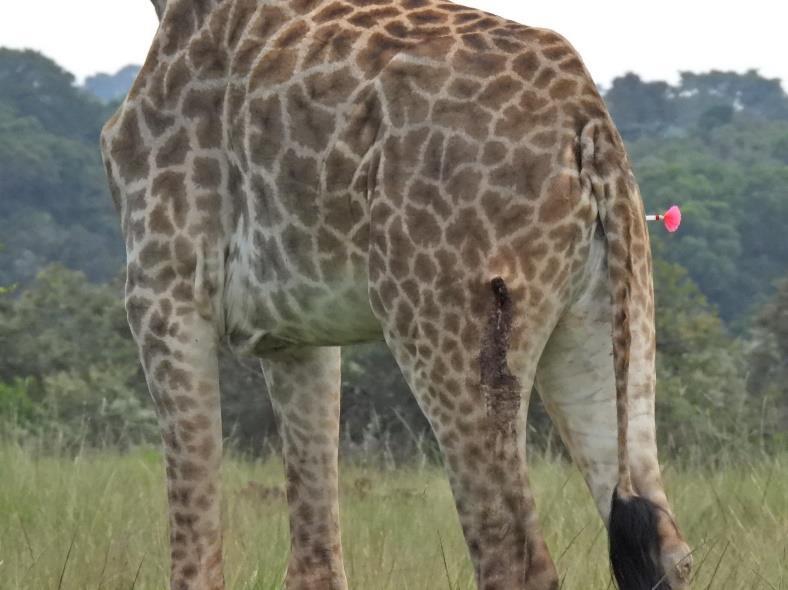
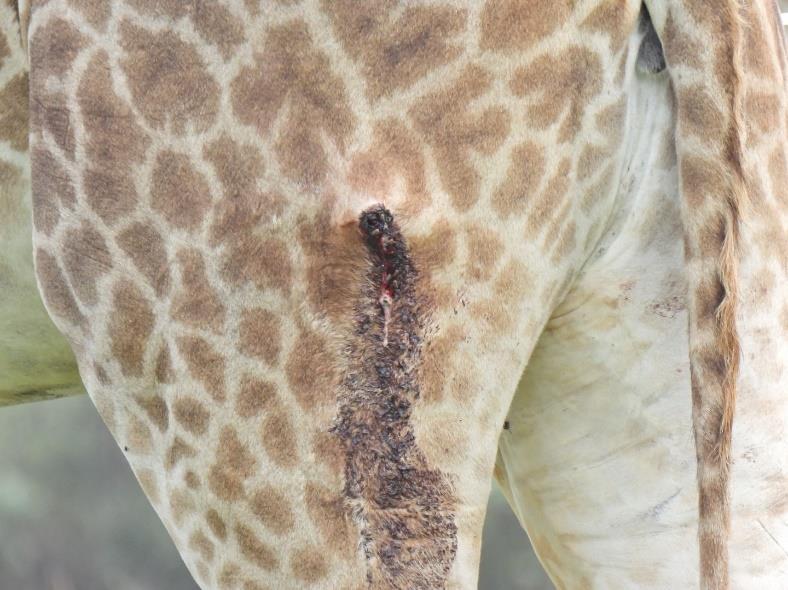
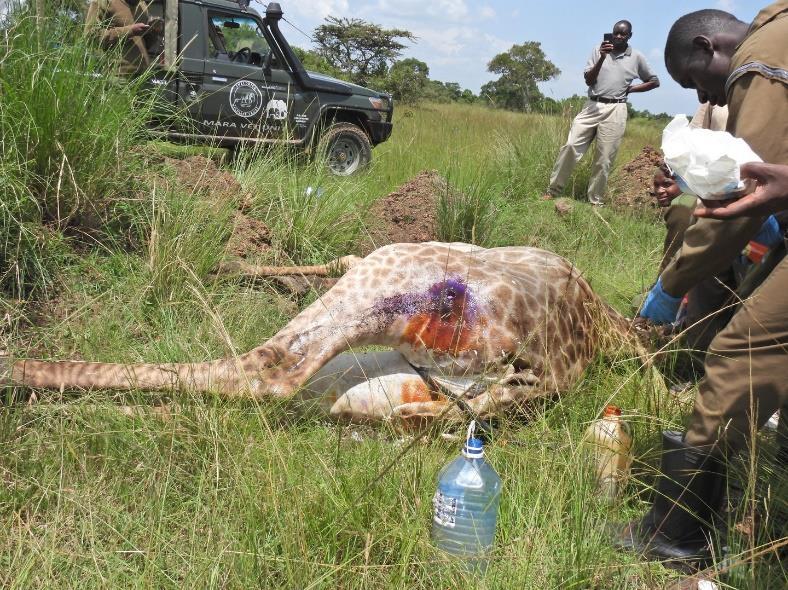
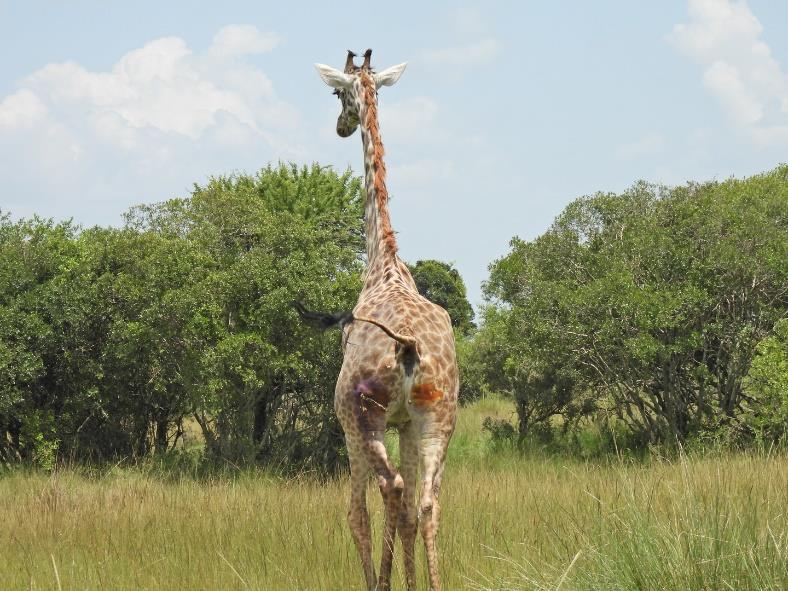
Case 3 – 13th February 2024
Case 4 – 13th February 2024
Elephant Speared
Siana Conservancy
The bull elephant was sighted and reported by Rangers while on patrol. The bull was spotted with a spear wound on the distal right left forelimb. The SWT Mara veterinary team was notified and immediately launched the operation. Immobilisation, examination and treatment
A dart was prepared, and he was successfully darted on the hind quarters with 16mgs Etorphine. After ten minutes, the elephant stopped moving and kept swaying from side to side. An attempt was done to physically bring down the elephant to lateral recumbency by physically pushing the elephant to one side. The efforts seemed futile but after a few trials, he went down on sternal recumbency. Both ears were used to cover the left and right eye shielding it from direct sunlight and dust.
On close examination the animal was discovered to have a spear wound on the right distal forelimb. The wound was infected and swollen. The wound was cleaned and disinfected with Hydrogen peroxide, then water and finally iodine. It was then sprayed topically with Oxytetracycline. Systemically the elephant was given 30000mgs of Amoxicillin and 50mgs Dexamethasone was administered intramuscularly.
Prognosis
Prognosis is good.
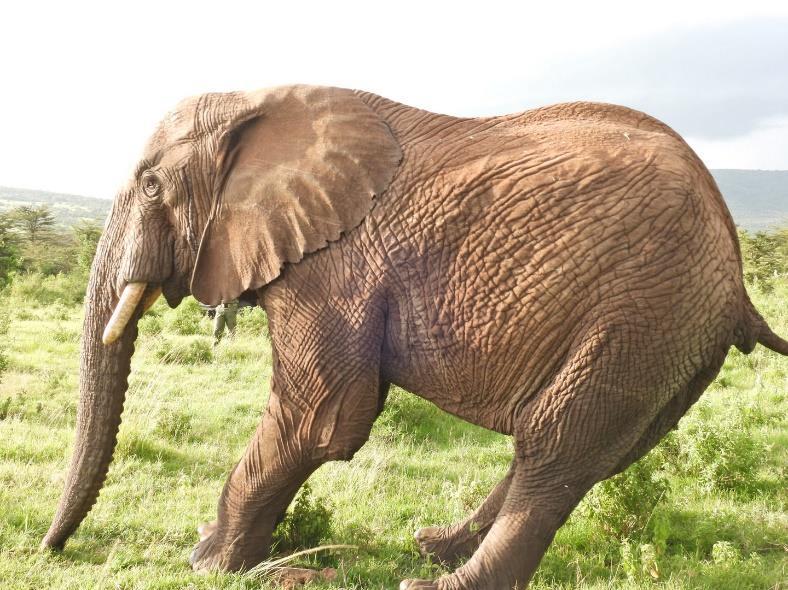
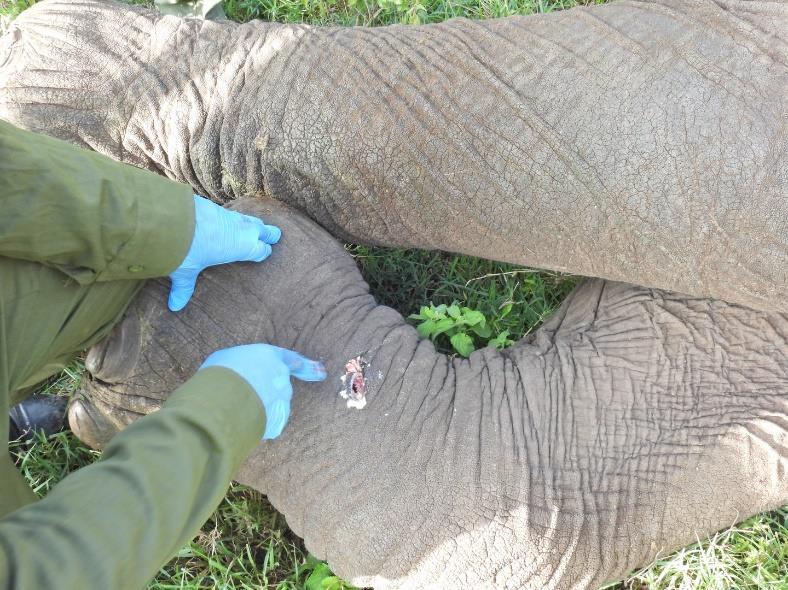

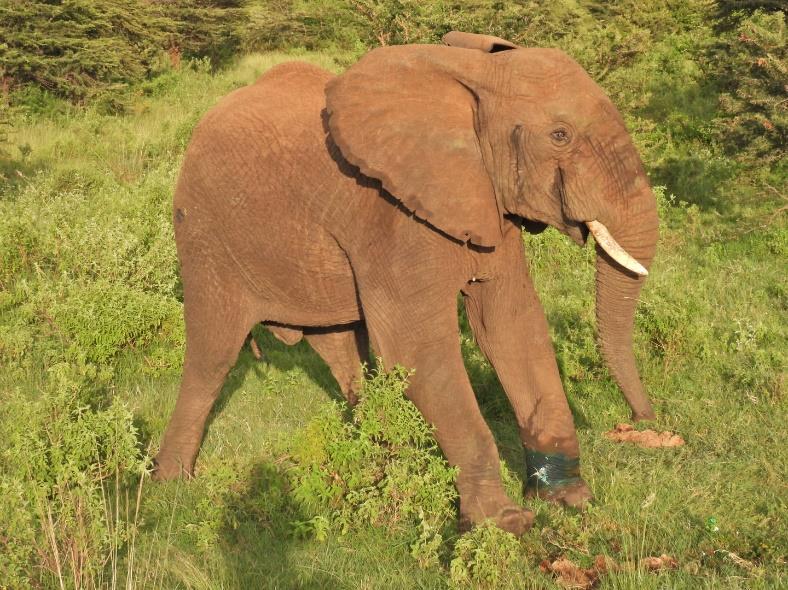
.
Case 5 – 13th February 2024
Elephant Spear
Masai Mara National Reserve
Another male adult bull elephant was sighted and reported by rangers while on patrol on the same date as the previous one. The bull was spotted with a massive spear wound that was highly infected on right flank with massive swelling of the inguinal glands.
Immobilisation, examination and treatment
A dart was prepared and he was successfully darted on the hind quarters with 16mgs Etorphine. After ten minutes, the elephant stopped moving and kept swaying from side to side. He went down on sternal recumbency. Both ears were used to cover the left and right eye shielding it from direct sunlight and dust.
On close examination the animal was discovered to have a spear wound on the right distal forelimb. The wound was infected and swollen. Dead tissues were removed leaving a pus infected hole that was disinfected with Hydrogen peroxide, water and finally iodine. Clay was used to cover the hole to aid in the closure of the wound. It was then sprayed topically with Oxytetracycline. Systemically it was given 30000 of Amoxicillin and 50mgs Dexamethasone was administered intramuscularly.
Prognosis
The prognosis is good since the dead tissues were removed which allows a proper blood circulation
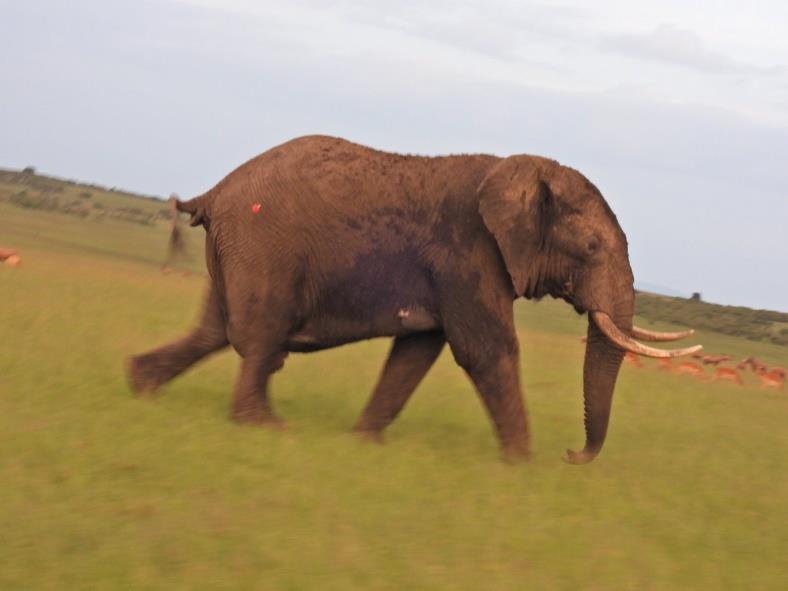
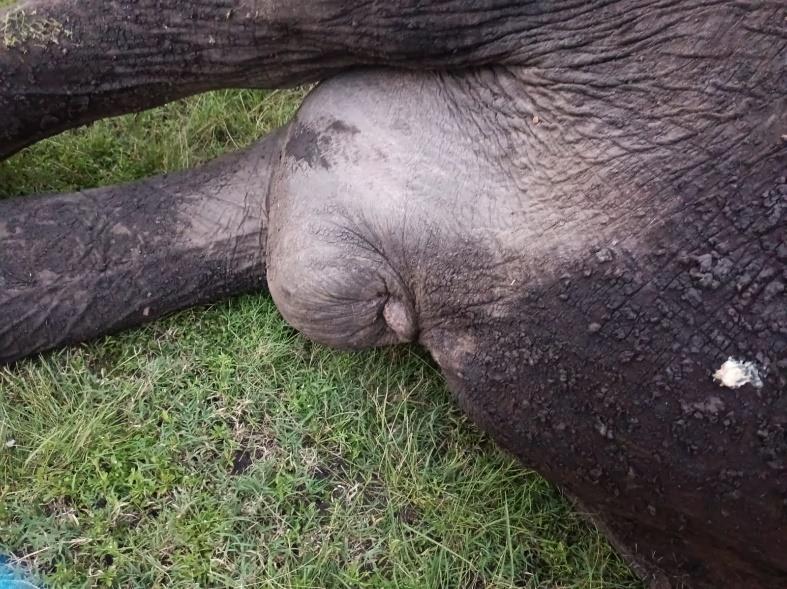
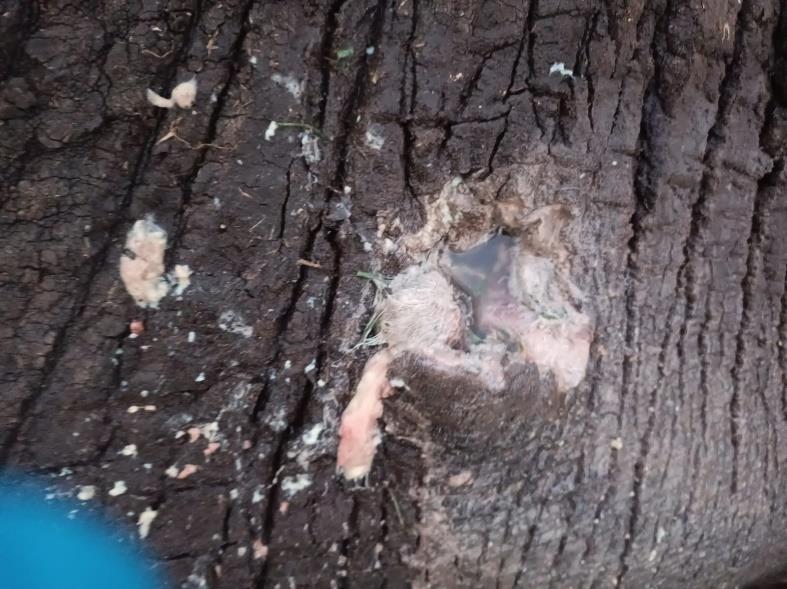
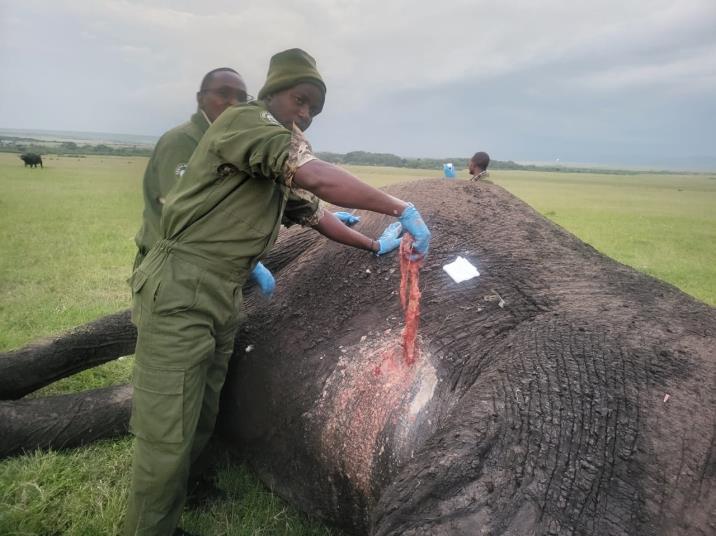
Zebra Snared Aitong
Aitong rangers on patrol spotted a common zebra with with a snare around on the distal phalanx of the right hindlimb . The animal was found lonely and reluctant to move.

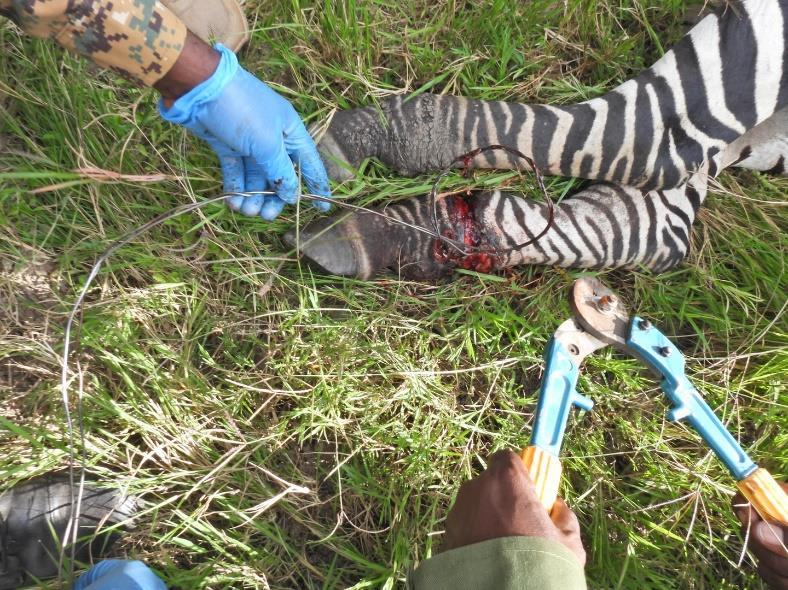
Immobilisation, examination and treatment
There was minimal time wasted as the animal was lonely and was spotted immediately on arrival. A 3mm dart was prepared composing of 6mgs Etorphine and 70mgs Azaperone. A vehicle was used to drive near the zebra, and it was darted successfully after three minutes. It was startled and kept walking away for five minutes when it attained standing immobilization and later went down on left lateral recumbency.
The tight snare had cut through the soft tissues and had reached the bone. The snared was lightly pulled and cut. The dead tissue was removed followed by cleaning and disinfection with Hydrogen peroxide, then water and finally Iodine. It was then sprayed topically with Oxytetracycline. Systemic administration of antibiotics was done using 15000mgs of Amoxicillin and 30mgs Dexamethasone anti-inflammatory intramuscularly.
Prognosis
The snared hadn’t damaged the bone tissue hence prognosis for recovery is good.
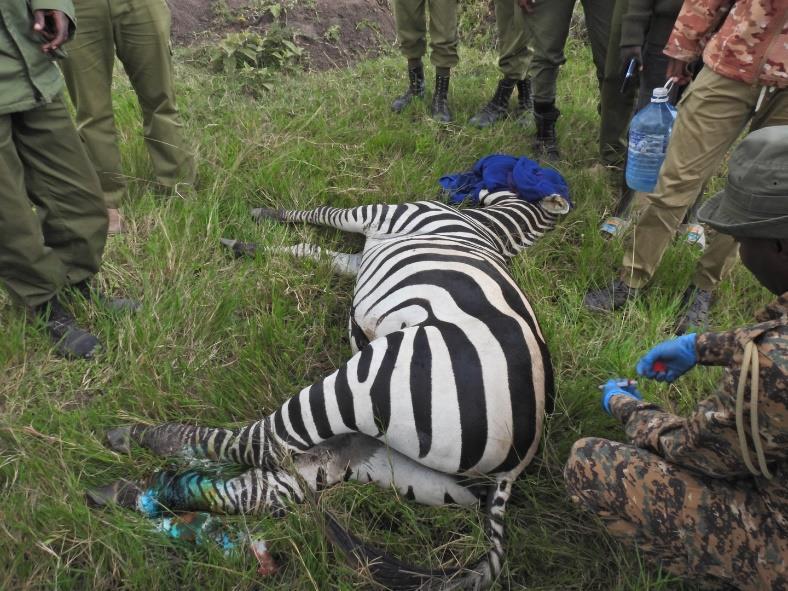

Case 6 – 5th February 2024
.
Elephant Spear
Siana Conservancy
The bull elephant was sighted and reported by rangers while on patrol. The bull was spotted with a spear wound on the left flank and the base of the tail.
Immobilisation, examination and treatment
A dart was prepared and he was successfully darted on the hind quarters with 16mgs Etorphine. After ten minutes, the elephant stopped moving and he was assisted to lie on the correct side. Both ears were used to cover the left and right eye shielding it from direct sunlight and dust. Water was doused on the animal to cool him down as the temperatures continued rising.
The wounds on the flank and near the tail were cleaned and disinfected with Hydrogen peroxide, then water and finally Iodine. An antibiotic was flushed into the wounds then they were sprayed topically with Oxytetracycline. He was systemically given 30,000mg of Amoxicillin and 50mgs Dexamethasone administered intramuscularly.
Prognosis
The prognosis is good since peritonitis isn’t expected.
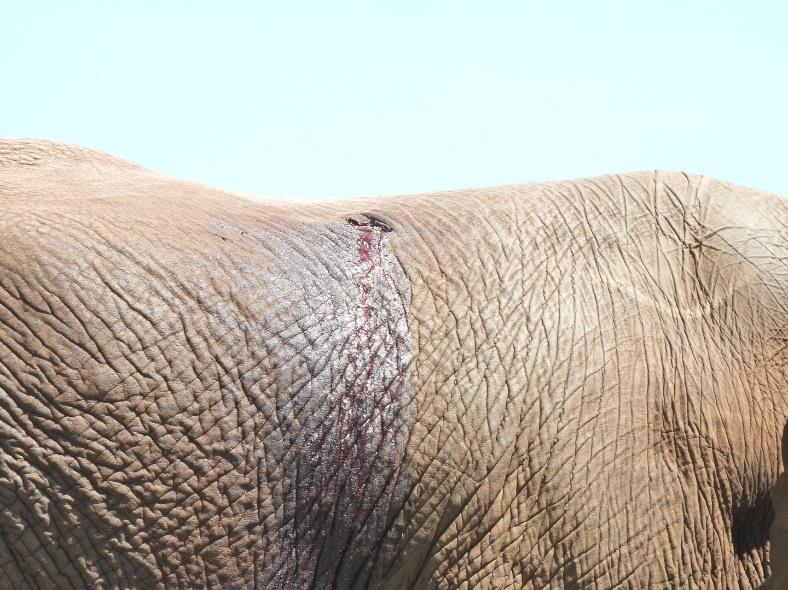
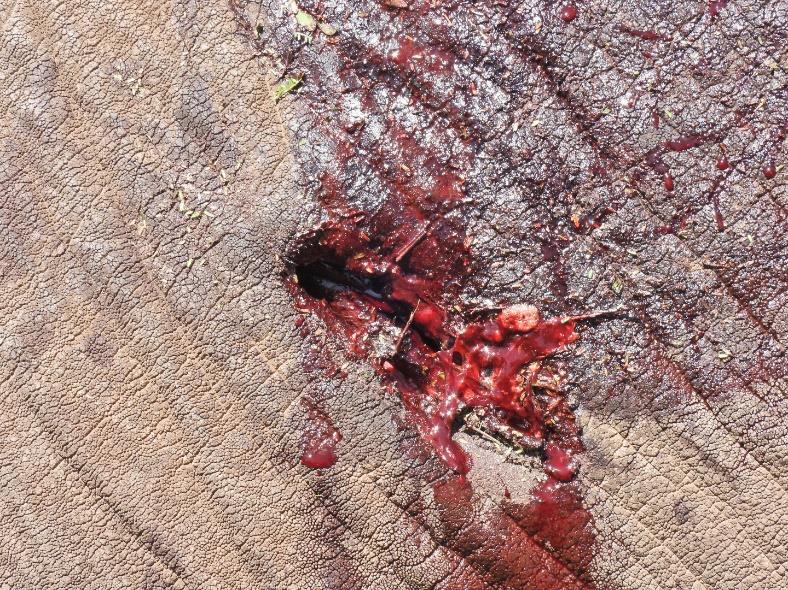
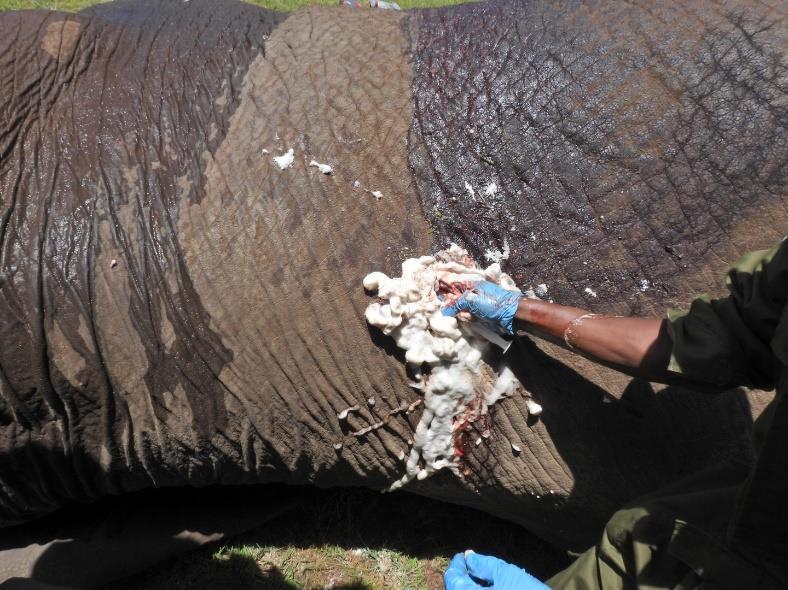
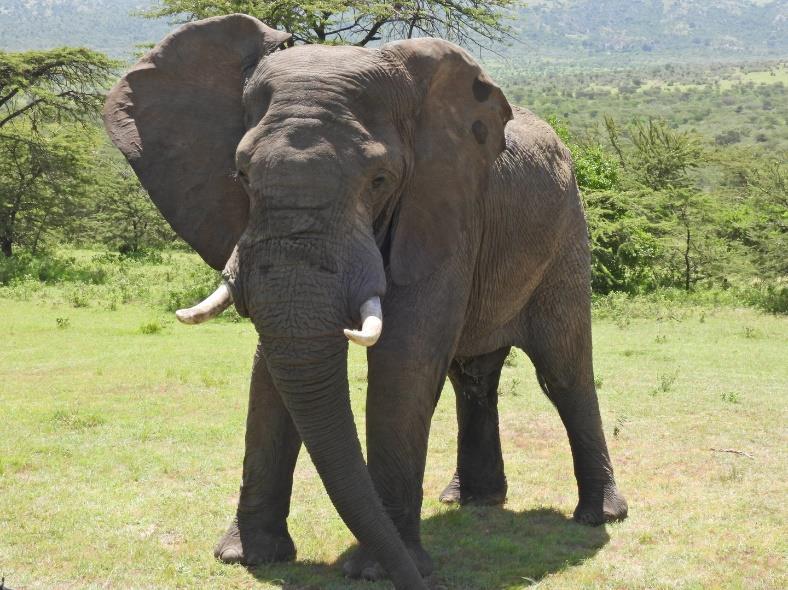
23rd
Case 7 –
February 2024
February 2024
Eland Natural Causes Sekenani
This orphaned eland calf, that is being hand raised, had a very poor condition with scanty hair coat. It appeared dull in demeanor.
Examination and treatment
As it is an orphan it did not require immobilisation.
It was administered 50mgs of Amoxicillin intramuscularly, 5mgs of Ivermectin subcutaneously and 10mgs of Catasol intramuscularly.
Prognosis
The prognosis is good since the calf was keep in good housing coupled with early intervention.
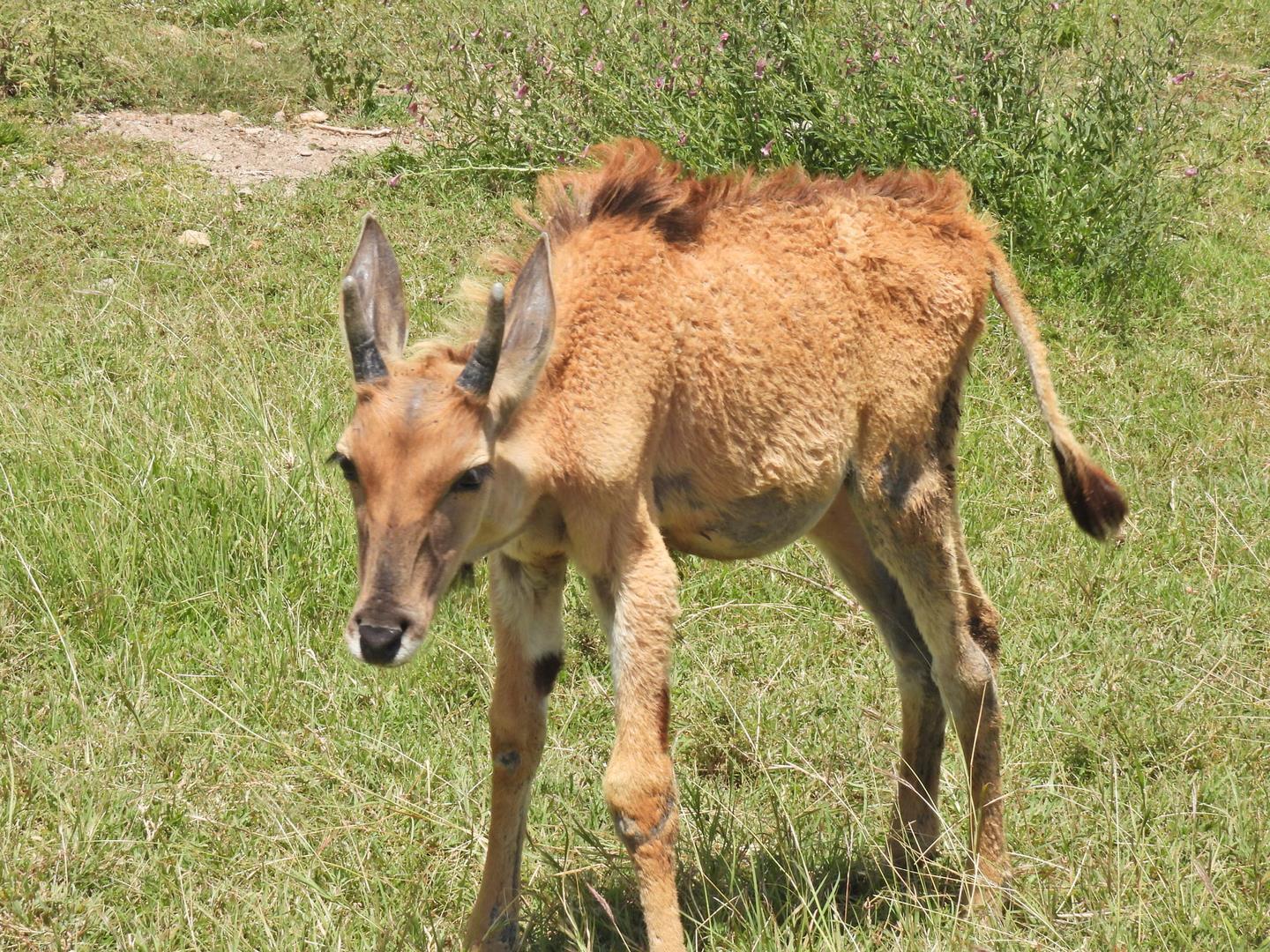
Case 8 – 23rd





































